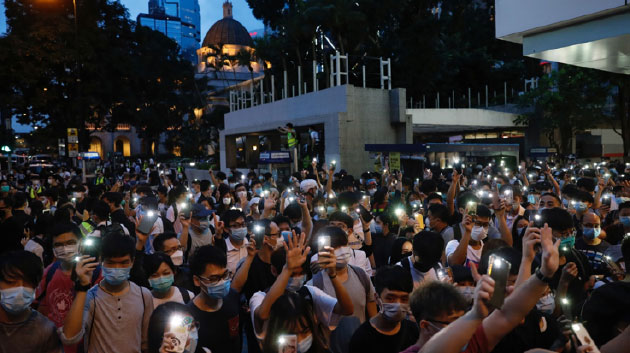National Security Law Issued Against Hong Kong
Hong Kong Oppression Prompts U.S. Anti-China Attacks
A year after the large-scale anti-government protest on June 9, protests were held in various parts of Hong Kong against the implementation of the national security law.(Photo:Reuters/Aflo)
The Chinese government made a decision to apply their national security law on Hong Kong in late May, which will ban Hong Kong’s anti-institutional activities.
China is currently proceeding to finalize legalities regarding punishments and monitoring of anti-institutional activities (as of June 18).
Hong Kong has a “One Country, Two Systems” policy that guarantees its high-level autonomy, and mainland China’s laws should be inapplicable by law. However, the Chinese government is trying to apply their laws by coining the term “exceptions,” as outlined in the Hong Kong constitution.
The Fight for Power Has Already Begun on a Psychological Level
Agnes Chow Ting, the leader of democratic activities in Hong Kong, has emphasized the severity of this situation by stating, “If the national security law is implemented, China’s police can arrest and deport people to China, even if you are in Hong Kong. If that happens, then it’s over.” The coronavirus has made gatherings illegal, and many protesters have already been arrested.
U.S. President Donald Trump asserted that “China has replaced One Country, Two Systems with One Country, One System,” in the end of May. President Trump announced that he intended to end preferential treatment for Hong Kong due to China’s action.
In addition, Mr. Trump indicated that he is thinking about changing G-7, an organization consisting of seven major nations, into G-11 by including India, Australia, South Korea and Russia into the alliance. This move will further corner China.
The U.K., a former colonial power of Hong Kong, has announced that they are opening a “‘path to citizenship” for millions of Hong Kong people to obtain British citizenship. Furthermore, countries such as the U.K., Canada and Germany are hindering China by moving toward a policy that excludes Huawei, a major information and communications technology company in the 5G mobile network in China.
Meanwhile, protests are spreading across the U.S. after the killing of a black man by a white police officer.
Amid this chaos, videos of Chinese officials who are fueling riots and destructive activities are being spread. Some of these officials are doing work with the embassy. In fact, U.S. Attorney General Barr stated that “There was evidence that militant groups such as Antifa incited violence,” and that foreign intervention was a part of this.
Such movements show that the U.S.-China “psychological hegemony war” is occurring at an accelerated pace as a result of the Hong Kong situation. This is a clash of civilizations between western democratic government with a firm belief in human rights, and the Chinese dictatorial communist government that prioritizes the objective of the nation above all else.
A Pinpoint Attack on Xi Jinping!?
Amidst these turn of events, Happy Science CEO Ryuho Okawa performed a spiritual reading on the deity, Shiva, in late May. Shiva is one of “‘the Hindu triad” or “‘the Great Trinity,” supreme beings in Hinduism. Shiva is also known as the god of destruction and creation.
Shiva pointed out that the year 2020 marks a crossroad for future civilizations. Given the upcoming U.S. presidential elections, Shiva pointed out that President Trump could potentially target Mr. Xi or wipe out a whole area where China’s leaders reside with a missile attack as a warning to Mr. Xi.
At first this seems like a bold prophecy, but it is plausible as the China-originated novel coronavirus resulted in 120,000 victims in the U.S., and Mr. Trump has mentioned the possibility of cutting diplomatic relations with China as a result; the U.S. bipartisan parties have united in regard to the Hong Kong situation. Ever since China began putting political pressure on Hong Kong, it became foreseeable for Mr. Trump to initiate a military attack on China.
Prime Minister Shinzo Abe stated, “‘Japan wants to lead the Hong Kong situation in a joint situation in the G-7 Summit.” However, Japan’s diplomacy will be put to test, far beyond such levels.



















